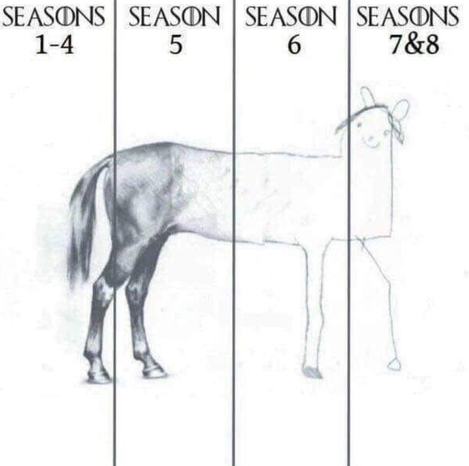|
Issue 11, Semester 1, 2019 LACHLAN SMITH *SPOILERS FOR GAME OF THRONES SEASON 8 ARE CONTAINED WITHIN!* I love Game of Thrones. So much so that I put down A Storm of Swords around season three to better enjoy the television series. This is rare for me—I’m one of those wankers that usually praises books over their adaptations. Martin has always been a better storyteller than a writer, and the storytelling was wonderfully appropriated for our screens (whether it be via Foxtel, or through other reproachable methods). But now I hate it. Not for the reasons that upset us before, such as characters failing due to their own flaws or completely avoidable mistakes. But rather due to a new breed of character failure that is born from poor screenwriting, and the desire of the showrunners to reach the series finish line.
The final season has been rushing through the various plot threads and stories, to give them satisfactory conclusions before the end. However, there just isn’t the time left to do them justice. We have been marinating these characters for years, and to have their narrative arcs reach resolution in eighty minutes is jarring. Alongside this is an unshakable meta perception of the show; certain events have to happen at X and Y for Z to occur. It becomes a loop of subverting our expectations by subverting our expectations, because certain things must happen for us to have an ending. The show’s haste was particularly noticeable in the penultimate episode with Varys. Having him plot against Dany was believable, but his turn was given no time to develop. Dany’s descent into madness—probably the most divisive of the lot—was another development that had plenty of simmering suggestion, let down by a clumsy and jarring execution. These fumbles have been an issue plaguing the series since its departure from the books. I first noticed this with Littlefinger. His final attempt at scheming made no sense and served only to lead to his execution. It was a twelve-year-old’s idea of a poetic ending and cried out hasty departure for the rest of us. The showrunners don’t seem to be sure what do with the smorgasbord of characters built up over the years, and so resort to simply killing them off, rather than letting them go on living off-screen. This is exacerbated by the show’s new disposition to telling rather than showing. We used to see how smart Tyrion was, and now we are just told it by other characters, leaving him a shadow of his former character—but that’s an essay in itself. However, the greatest tragedy here isn’t Dany’s completely avoidable descent into madness, and the other conclusions to our characters. Rather, there was simply no way the series itself could ‘win.’ The conclusion was always going to be divisive, and viewers always unhappy. This is largely due to the reasons why we love GoT in the first place. We felt for these characters that were gritty, flawed and real. Set in a world that is larger and more important than the protagonists, where no one—no matter how important—was safe from the consequences of their actions. But as the series concludes, the audience is confronted with the dissonance between this ‘realism’ that had drawn us in, and our desire to have a cathartic conclusion. The show runners’ effort to wrap up the various plotlines, stories and character arcs, has given us resolutions that are inconsistent with the show’s realistic foundations. Not all threads need to be tied up. Indeed, the world moved on after the deaths of many of our protagonists. However, in the last few weeks, we have been ticking the boxes in the lead-up to the finale: Cersei, Jaime, the Cleganes, the Night King, Ser Friendzone, Varys, the list goes on. But have you thought about Edmure Tully? Last we saw him he was rotting in a dungeon. Possibly he has been rescued by now? But it doesn’t matter; the point is that loose threads are okay. The world doesn’t end with the series, and the characters and auxiliary stories don’t all necessarily need to be resolved. The final season, like the rest of the series, could have challenged conventional cinema tropes. People have been left unsatisfied, with even some clamouring for a remake of the series’ ending. This echoes what happened with the Mass Effect video game trilogy, where an unsatisfactory conclusion led to the developers revisiting and amending the ending. Something similar happened with Fullmetal Alchemist—where the animated series overtook its source material and deviated substantially from the ‘true’ ending. The series was remade a few years later with the original cast, depicting the source material’s ending to critical acclaim. Something like this could happen for GoT, where the ending could be redone to align with the books. But this is more easily done with interactive media and anime than it is with live action. Recasting actors is impossible and bringing them back would be incredibly expensive. And, well, there aren’t any more books yet. This iteration of GoT has had its chance, and merely revisiting the ending with new writers isn’t likely to yield better results without proper time and investment. This all being said; I’ll watch this last episode with an open mind. I’ll still enjoy it for what it is, and not for what it isn’t. Surely it can’t be as bad as exams, but I probably know about as much as the showrunners and Jon Snow. Editor’s Note: This piece was submitted prior to the broadcast of the series finale. Also, we’re having friends over to watch it tonight, so please no spoilers in the comments for the next few hours! Lachlan is a Third Year JD Student.
President Targaryen
21/5/2019 08:16:28 pm
IT WAS HER TURN!
Sam
21/5/2019 09:05:29 pm
**SPOILERS FOR A DANCE WITH DRAGONS BELOW, CONSIDER YOURSELF WARNED** Comments are closed.
|
Archives
October 2022
|



